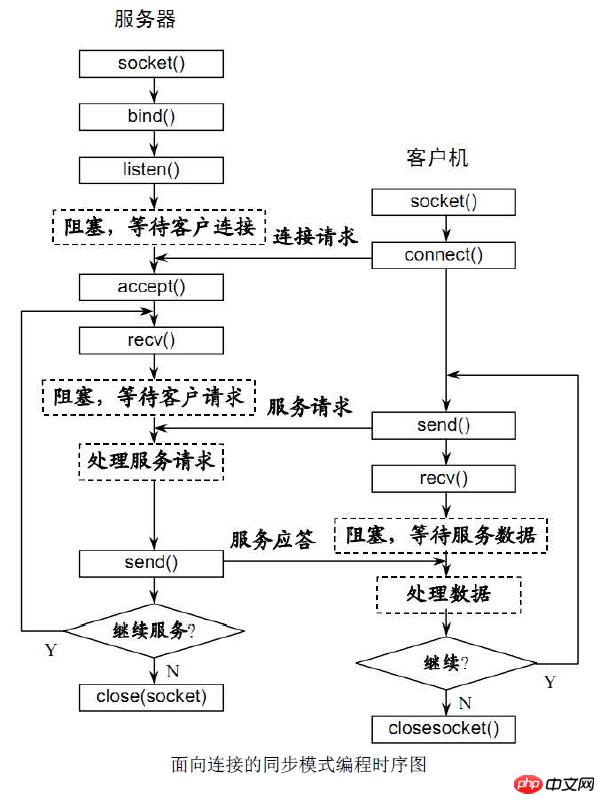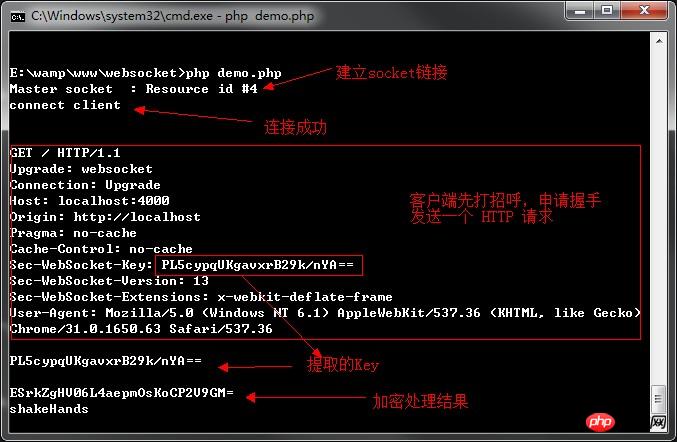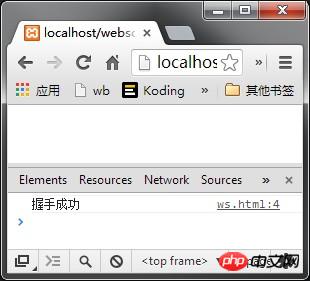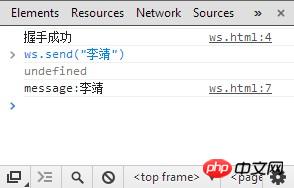Detailed introduction to websocket in php
Below I drew a picture to demonstrate the handshake part when establishing a websocket connection between client and server. This part can be completed very easily in node, because the net module provided by node has already encapsulated the socket. When developers use it, they only need to consider the interaction of data and do not need to deal with the establishment of connections. However, PHP does not. From socket connection, establishment, binding, monitoring, etc., we need to operate these ourselves, so it is necessary to take it out and talk about it.
+--------+ 1.发送Sec-WebSocket-Key +---------+
| | --------------------------------> | |
| | 2.加密返回Sec-WebSocket-Accept | |
| client | <-------------------------------- | server |
| | 3.本地校验 | |
| | --------------------------------> | |
+--------+ +--------+Students who read the last article I wrote should have a relatively comprehensive understanding of the above picture. ① and ② are actually an HTTP request and response, but what we get during the processing is an unparsed string. For example:
GET /chat HTTP/1.1Host: server.example.com Origin: http://example.com
The request we usually see looks like this. When this thing reaches the server, we can get this information directly through some code libraries.
1. Processing websocket in php
WebSocket connection is initiated by the client, so everything must start from the client. The first step is to parse the Sec-WebSocket-Key string sent by the client.
GET /chat HTTP/1.1Host: server.example.com Upgrade: websocket Connection: UpgradeSec-WebSocket-Key: dGhlIHNhbXBsZSBub25jZQ==Origin: http://example.com Sec-WebSocket-Protocol: chat, superchat Sec-WebSocket-Version: 13
The format of the client request is also mentioned in the previous article (as above). First, php establishes a socket connection and listens for the port information.
1. Establishment of socket connection
Regarding the establishment of socket, I believe many people who have studied computer network in college know it. The following is a process of establishing a connection:

// 建立一个 socket 套接字$master = socket_create(AF_INET, SOCK_STREAM, SOL_TCP); socket_set_option($master, SOL_SOCKET, SO_REUSEADDR, 1); socket_bind($master, $address, $port); socket_listen($master);
Compared with node, the processing of this place is too troublesome. The above lines of code do not establish a connection, but these codes It is something that must be written to establish a socket. Since the processing process is slightly complicated, I wrote various processes into a class to facilitate management and calling.
//demo.php
Class WS {
var $master; // 连接 server 的 client
var $sockets = array(); // 不同状态的 socket 管理
var $handshake = false; // 判断是否握手
function __construct($address, $port){
// 建立一个 socket 套接字
$this->master = socket_create(AF_INET, SOCK_STREAM, SOL_TCP)
or die("socket_create() failed");
socket_set_option($this->master, SOL_SOCKET, SO_REUSEADDR, 1)
or die("socket_option() failed");
socket_bind($this->master, $address, $port)
or die("socket_bind() failed");
socket_listen($this->master, 2)
or die("socket_listen() failed");
$this->sockets[] = $this->master;
// debug
echo("Master socket : ".$this->master."\n");
while(true) {
//自动选择来消息的 socket 如果是握手 自动选择主机
$write = NULL;
$except = NULL;
socket_select($this->sockets, $write, $except, NULL);
foreach ($this->sockets as $socket) {
//连接主机的 client
if ($socket == $this->master){
$client = socket_accept($this->master);
if ($client < 0) {
// debug
echo "socket_accept() failed";
continue;
} else {
//connect($client);
array_push($this->sockets, $client);
echo "connect client\n";
}
} else {
$bytes = @socket_recv($socket,$buffer,2048,0);
if($bytes == 0) return;
if (!$this->handshake) {
// 如果没有握手,先握手回应
//doHandShake($socket, $buffer);
echo "shakeHands\n";
} else {
// 如果已经握手,直接接受数据,并处理
$buffer = decode($buffer);
//process($socket, $buffer);
echo "send file\n";
}
}
}
}
}
}
The above code has been debugged by me. There is no big problem. If you want to test it, you can type php /path/to in the cmd command line. /demo.php;Of course, the above is just a class. If you want to test, you have to create a new instance.
$ws = new WS('localhost', 4000);
The client code can be slightly simpler:
var ws = new WebSocket("ws://localhost:4000");
ws.onopen = function(){
console.log("握手成功");
};
ws.onerror = function(){
console.log("error");
};Run the server code when the client connects , we can see:

#The entire communication process can be clearly seen through the above code. The first is to establish a connection. This step in node has been encapsulated in the net and http modules, and then determines whether to shake hands. If not, shakeHands. For the handshake here, I directly echoed a word to indicate that this thing was carried out. We mentioned the handshake algorithm earlier, so I wrote it directly here.
2. Extract Sec-WebSocket-Key information
function getKey($req) {
$key = null;
if (preg_match("/Sec-WebSocket-Key: (.*)\r\n/", $req, $match)) {
$key = $match[1];
} return $key;
}This is relatively simple, direct regular matching, the websocket information header must contain Sec-WebSocket-Key, So we can match it faster~
3. Encrypt Sec-WebSocket-Key
function encry($req){
$key = $this->getKey($req);
$mask = "258EAFA5-E914-47DA-95CA-C5AB0DC85B11";
return base64_encode(sha1($key . '258EAFA5-E914-47DA-95CA-C5AB0DC85B11', true));
}Encrypt the SHA-1 encrypted string again base64 encryption. If the encryption algorithm is wrong, the client will directly report an error when checking:

4. Respond to Sec-WebSocket-Accept
function dohandshake($socket, $req){
// 获取加密key
$acceptKey = $this->encry($req);
$upgrade = "HTTP/1.1 101 Switching Protocols\r\n" .
"Upgrade: websocket\r\n" .
"Connection: Upgrade\r\n" .
"Sec-WebSocket-Accept: " . $acceptKey . "\r\n" .
"\r\n"; // 写入socket
socket_write(socket,$upgrade.chr(0), strlen($upgrade.chr(0)));
// 标记握手已经成功,下次接受数据采用数据帧格式
$this->handshake = true;
}Be sure to pay attention here. Each request and corresponding format has a blank line at the end, which is \r\n. I lost this when I started testing. , struggled for a long time.

When the client successfully checks the key, the onopen function will be triggered:

5. Data frame processing
// 解析数据帧
function decode($buffer) {
$len = $masks = $data = $decoded = null;
$len = ord($buffer[1]) & 127;
if ($len === 126) {
$masks = substr($buffer, 4, 4);
$data = substr($buffer, 8);
} else if ($len === 127) {
$masks = substr($buffer, 10, 4);
$data = substr($buffer, 14);
} else {
$masks = substr($buffer, 2, 4);
$data = substr($buffer, 6);
} for ($index = 0; $index < strlen($data); $index++) {
$decoded .= $data[$index] ^ $masks[$index % 4];
} return $decoded;
}The encoding issues involved here have been mentioned in the previous article, so I won’t go into details here. PHP has too many functions for character processing, and I don’t remember them very clearly. There is no detailed introduction to the decoding program here. The data sent by the client is directly returned as it is. It can be regarded as a chat room mode.
// 返回帧信息处理
function frame($s) {
$a = str_split($s, 125);
if (count($a) == 1) {
return "\x81" . chr(strlen($a[0])) . $a[0];
} $ns = ""; foreach ($a as $o) {
$ns .= "\x81" . chr(strlen($o)) . $o;
} return $ns;
}// 返回数据
function send($client, $msg){
$msg = $this->frame($msg);
socket_write($client, $msg, strlen($msg));
}Client code:
var ws = new WebSocket("ws://localhost:4000");
ws.onopen = function(){
console.log("握手成功");
};
ws.onmessage = function(e){
console.log("message:" + e.data);
};
ws.onerror = function(){
console.log("error");
};
ws.send("李靖");Send data after the connection, and the server returns as is:

2. Attention issues
1. Websocket version problem
The client has in the request during handshake Sec-WebSocket-Version: 13, such a version identification, this is an upgraded version, and current browsers use this version. The previous version was more troublesome in the data encryption part. It would send two keys:
GET /chat HTTP/1.1Host: server.example.com Upgrade: websocket Connection: Upgrade Origin: http://example.com Sec-WebSocket-Protocol: chat, superchatSec-WebSocket-Key1: xxxxSec-WebSocket-Key2: xxxx
如果是这种版本(比较老,已经没在使用了),需要通过下面的方式获取
function encry($key1,$key2,$l8b){ //Get the numbers preg_match_all('/([\d]+)/', $key1, $key1_num); preg_match_all('/([\d]+)/', $key2, $key2_num);
$key1_num = implode($key1_num[0]);
$key2_num = implode($key2_num[0]);
//Count spaces
preg_match_all('/([ ]+)/', $key1, $key1_spc);
preg_match_all('/([ ]+)/', $key2, $key2_spc);
if($key1_spc==0|$key2_spc==0){ $this->log("Invalid key");
return; } //Some math
$key1_sec = pack("N",$key1_num / $key1_spc);
$key2_sec = pack("N",$key2_num / $key2_spc);
return md5($key1_sec.$key2_sec.$l8b,1);
}只能无限吐槽这种验证方式!相比 nodeJs 的 websocket 操作方式:
//服务器程序var crypto = require('crypto');var WS = '258EAFA5-E914-47DA-95CA-C5AB0DC85B11';
require('net').createServer(function(o){ var key;
o.on('data',function(e){ if(!key){ //握手
key = e.toString().match(/Sec-WebSocket-Key: (.+)/)[1];
key = crypto.createHash('sha1').update(key + WS).digest('base64');
o.write('HTTP/1.1 101 Switching Protocols\r\n');
o.write('Upgrade: websocket\r\n');
o.write('Connection: Upgrade\r\n');
o.write('Sec-WebSocket-Accept: ' + key + '\r\n');
o.write('\r\n');
}else{
console.log(e);
};
});
}).listen(8000);多么简洁,多么方便!有谁还愿意使用 php 呢。。。。
The above is the detailed content of Detailed introduction to websocket in php. For more information, please follow other related articles on the PHP Chinese website!

Hot AI Tools

Undresser.AI Undress
AI-powered app for creating realistic nude photos

AI Clothes Remover
Online AI tool for removing clothes from photos.

Undress AI Tool
Undress images for free

Clothoff.io
AI clothes remover

Video Face Swap
Swap faces in any video effortlessly with our completely free AI face swap tool!

Hot Article

Hot Tools

Notepad++7.3.1
Easy-to-use and free code editor

SublimeText3 Chinese version
Chinese version, very easy to use

Zend Studio 13.0.1
Powerful PHP integrated development environment

Dreamweaver CS6
Visual web development tools

SublimeText3 Mac version
God-level code editing software (SublimeText3)

Hot Topics
 PHP 8.4 Installation and Upgrade guide for Ubuntu and Debian
Dec 24, 2024 pm 04:42 PM
PHP 8.4 Installation and Upgrade guide for Ubuntu and Debian
Dec 24, 2024 pm 04:42 PM
PHP 8.4 brings several new features, security improvements, and performance improvements with healthy amounts of feature deprecations and removals. This guide explains how to install PHP 8.4 or upgrade to PHP 8.4 on Ubuntu, Debian, or their derivati
 7 PHP Functions I Regret I Didn't Know Before
Nov 13, 2024 am 09:42 AM
7 PHP Functions I Regret I Didn't Know Before
Nov 13, 2024 am 09:42 AM
If you are an experienced PHP developer, you might have the feeling that you’ve been there and done that already.You have developed a significant number of applications, debugged millions of lines of code, and tweaked a bunch of scripts to achieve op
 How To Set Up Visual Studio Code (VS Code) for PHP Development
Dec 20, 2024 am 11:31 AM
How To Set Up Visual Studio Code (VS Code) for PHP Development
Dec 20, 2024 am 11:31 AM
Visual Studio Code, also known as VS Code, is a free source code editor — or integrated development environment (IDE) — available for all major operating systems. With a large collection of extensions for many programming languages, VS Code can be c
 Explain JSON Web Tokens (JWT) and their use case in PHP APIs.
Apr 05, 2025 am 12:04 AM
Explain JSON Web Tokens (JWT) and their use case in PHP APIs.
Apr 05, 2025 am 12:04 AM
JWT is an open standard based on JSON, used to securely transmit information between parties, mainly for identity authentication and information exchange. 1. JWT consists of three parts: Header, Payload and Signature. 2. The working principle of JWT includes three steps: generating JWT, verifying JWT and parsing Payload. 3. When using JWT for authentication in PHP, JWT can be generated and verified, and user role and permission information can be included in advanced usage. 4. Common errors include signature verification failure, token expiration, and payload oversized. Debugging skills include using debugging tools and logging. 5. Performance optimization and best practices include using appropriate signature algorithms, setting validity periods reasonably,
 PHP Program to Count Vowels in a String
Feb 07, 2025 pm 12:12 PM
PHP Program to Count Vowels in a String
Feb 07, 2025 pm 12:12 PM
A string is a sequence of characters, including letters, numbers, and symbols. This tutorial will learn how to calculate the number of vowels in a given string in PHP using different methods. The vowels in English are a, e, i, o, u, and they can be uppercase or lowercase. What is a vowel? Vowels are alphabetic characters that represent a specific pronunciation. There are five vowels in English, including uppercase and lowercase: a, e, i, o, u Example 1 Input: String = "Tutorialspoint" Output: 6 explain The vowels in the string "Tutorialspoint" are u, o, i, a, o, i. There are 6 yuan in total
 How do you parse and process HTML/XML in PHP?
Feb 07, 2025 am 11:57 AM
How do you parse and process HTML/XML in PHP?
Feb 07, 2025 am 11:57 AM
This tutorial demonstrates how to efficiently process XML documents using PHP. XML (eXtensible Markup Language) is a versatile text-based markup language designed for both human readability and machine parsing. It's commonly used for data storage an
 Explain late static binding in PHP (static::).
Apr 03, 2025 am 12:04 AM
Explain late static binding in PHP (static::).
Apr 03, 2025 am 12:04 AM
Static binding (static::) implements late static binding (LSB) in PHP, allowing calling classes to be referenced in static contexts rather than defining classes. 1) The parsing process is performed at runtime, 2) Look up the call class in the inheritance relationship, 3) It may bring performance overhead.
 What are PHP magic methods (__construct, __destruct, __call, __get, __set, etc.) and provide use cases?
Apr 03, 2025 am 12:03 AM
What are PHP magic methods (__construct, __destruct, __call, __get, __set, etc.) and provide use cases?
Apr 03, 2025 am 12:03 AM
What are the magic methods of PHP? PHP's magic methods include: 1.\_\_construct, used to initialize objects; 2.\_\_destruct, used to clean up resources; 3.\_\_call, handle non-existent method calls; 4.\_\_get, implement dynamic attribute access; 5.\_\_set, implement dynamic attribute settings. These methods are automatically called in certain situations, improving code flexibility and efficiency.






